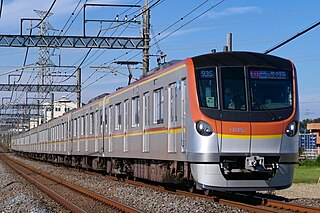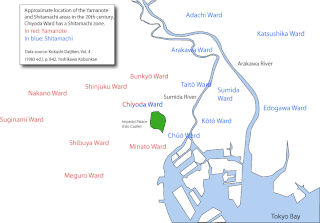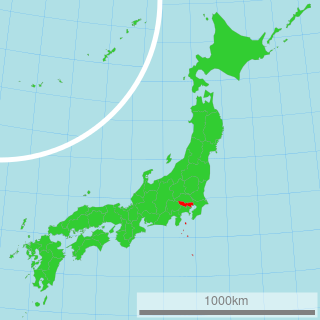
Shinjuku, officially called Shinjuku City, is a special ward of Tokyo, Japan. It is a major commercial and administrative center, housing the northern half of the busiest railway station in the world as well as the Tokyo Metropolitan Government Building, the administrative center of the Tokyo Metropolitan Government. As of 2018, the ward has an estimated population of 346,235 and a population density of 18,232 people per km2. The total area is 18.23 km2. Since the end of World War II, Shinjuku has become a major secondary center of Tokyo (fukutoshin), rivaling the original city center in Marunouchi.

Shibuya is a special ward in the Tokyo Metropolis, Japan. A major commercial and finance center, Shibuya houses two of the busiest railway stations in the world, Shibuya Station and Shinjuku Station. As of January 1, 2024, Shibuya Ward has an estimated population of 230,609 in 142,443 households and a population density of 15,262.01 people per km2. The total area is 15.11 km2. Notable neighborhoods and districts of Shibuya include Harajuku, Ebisu, Omotesandō, Yoyogi and Sendagaya. "Shibuya" is also commonly used to refer to the area surrounding Shibuya Station, an area known as a major center for Japanese fashion and youth culture, and one of Tokyo's most popular nightlife areas.

Special wards are a special form of municipalities in Japan under the 1947 Local Autonomy Law. They are city-level wards: primary subdivisions of a prefecture with municipal autonomy largely comparable to other forms of municipalities.

Teichiku Records is a Japanese record label, run by Teichiku Entertainment, that specializes in enka, kayōkyoku, and similar music. Teichiku is an abbreviation for Teikoku Chikuonki, the former name of the company. Teichiku Entertainment also runs the record labels Imperial Records, Takumi Note, and Union Records. It is a division of commercial karaoke manufacturer XING Inc., itself a subsidiary of Brother Industries.

Nakano is a special ward in the Tokyo Metropolis in Japan. The English translation of its Japanese self-designation is Nakano City.

Sumida is a special ward in the Tokyo Metropolis in Japan. The English translation of its Japanese self-designation is Sumida City.

Kōtō is a special ward in the Tokyo Metropolis in Japan. The ward refers to itself as Kōtō City in English. As of May 1, 2015, the ward has an estimated population of 488,632, and a population density of 12,170 persons per km2. The total area is approximately 40.16 km2.

Suginami is a special ward in the Tokyo Metropolis in Japan. The ward refers to itself as Suginami City in English.

Arakawa is a special ward in the Tokyo Metropolis in Japan. The ward takes its name from the Arakawa River, though the river does not run through or touch the ward. Its neighbors are the wards of Adachi, Kita, Bunkyo, Taito and Sumida. In English, the ward calls itself Arakawa City.

Adachi is a special ward in the Tokyo Metropolis in Japan. It is located to the north of the heart of Tokyo. The ward consists of two separate areas: a small strip of land between the Sumida River and Arakawa River and a larger area north of the Arakawa River. The ward is bordered by the cities of Kawaguchi, Sōka and Yashio in Saitama and Katsushika, Sumida, Arakawa and Kita in Tokyo. The ward is called Adachi City in English.

Chūō is a special ward in the Tokyo Metropolis in Japan. The ward refers to itself in English as Chūō City. It was formed in 1947 as a merger of Kyobashi and Nihonbashi wards following Tokyo City's transformation into Tokyo Metropolis.

The Tokyo Metro Fukutoshin Line, formally the No. 13 Fukutoshin Line, is a 20.2-kilometer (12.6 mi) subway line operated by Tokyo Metro in west-central Tokyo and Wako, Saitama, Japan. The newest line in the Tokyo subway network, it opened in stages between 1994 and 2008. On average, the Fukutoshin Line carried 362,654 passengers daily in 2017, the lowest of all Tokyo Metro lines and roughly one third of its sister Tokyo Metro Yūrakuchō Line (1,124,478).
The Tokyo Metropolitan Government Board of Education is the board of education in Tokyo, Japan. The board directly manages most of the public high schools in all 23 special wards, the Western Tokyo, and all islands under Tokyo's jurisdiction.

Sendagaya (千駄ヶ谷) is an area within Shibuya ward, one of the 23 special wards of Tokyo.

The Toei Bus is a bus service operated by the Bus Service Division, the Tokyo Metropolitan Bureau of Transportation. It is also called To Bus.

Yamanote (山の手) and Shitamachi (下町) are traditional names for two areas of Tokyo, Japan. Yamanote refers to the affluent, upper-class areas of Tokyo west of the Imperial Palace. While citizens once considered it as consisting of Hongo, Kōjimachi, Koishikawa, Ushigome, Yotsuya, Akasaka, Aoyama and Azabu in the Bunkyō, Chiyoda, Shinjuku, and Minato wards, its size has grown to include the Nakano, Suginami and Meguro wards. Shitamachi is the traditional name for the area of Tokyo including today the Adachi, Arakawa, Chiyoda, Chūō, Edogawa, Katsushika, Kōtō, Sumida, and Taitō wards, the physically low part of the city along and east of the Sumida River.

Dorei-ku: Boku to 23-nin no Dorei or simply Doreiku, is a Japanese novel series written by Shinichi Okada. A manga adaptation illustrated by Hiroto Ōishi ran for 10 volumes starting in 2012. A live action film was released under the title Tokyo Slaves in 2014, and an anime television series adaptation of the manga animated by Zero-G and TNK aired from April 13 to June 29, 2018.

Kasumigaoka district is a district of Shinjuku, Tokyo, Japan. It is a single town name that does not have a "chome" setting in the area where the residential address has been displayed.

Tokyo is one of Japan's leading jurisdictions when it comes to civil rights for lesbian, gay, bisexual, and transgender (LGBT) people. Jurisdictions in Tokyo were among the first to establish partnership registries for same-sex couples, and Tokyo became the tenth prefecture-level government to establish a registry in November 2022. Previously in 2018, Tokyo became the first prefecture-level government to enact an LGBT-inclusive human rights law protecting against discrimination and hate speech.


















